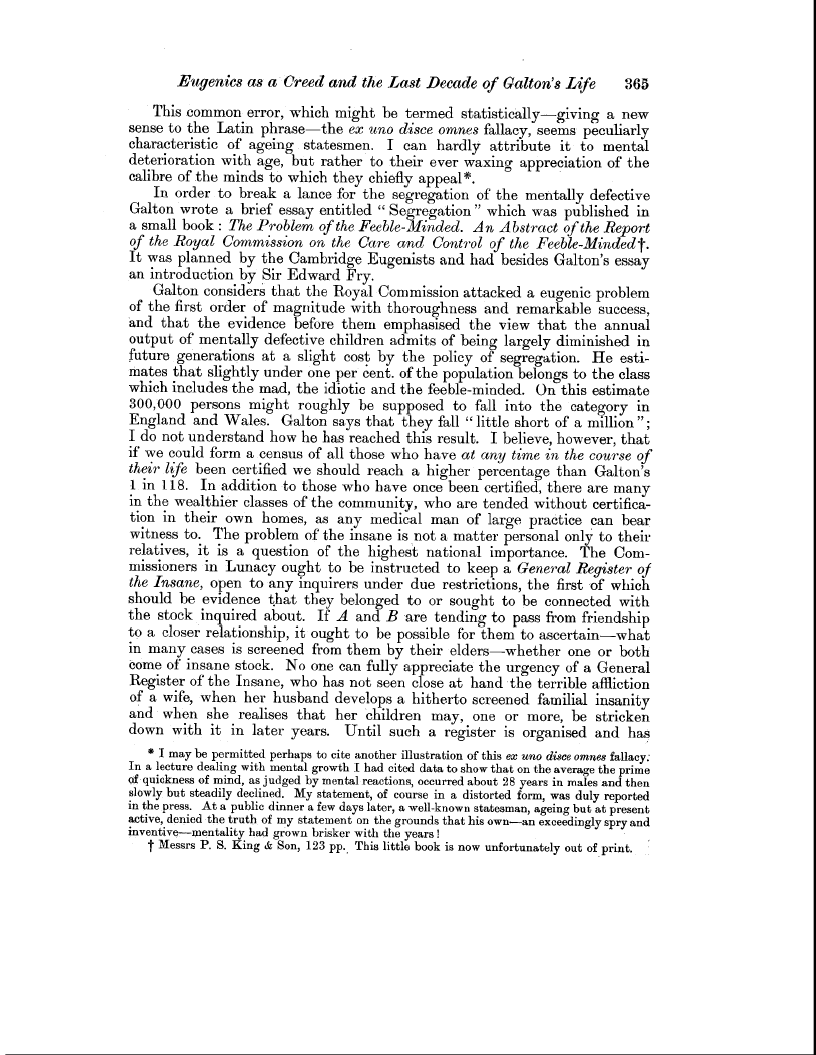| ||||||

OCR Rendition - approximate
Eugenics as a Creed and the Last Decade of Galton's Life 365 This common error, which might be termed statistically-giving a new sense to the Latin phrase-the ex uno disce omnes fallacy, seems peculiarly characteristic of ageing statesmen. I can hardly attribute it to mental deterioration with age, but rather to their ever waxing appreciation of the calibre of the minds to which they chiefly appeal*. In order to break a lance for the segregation of the mentally defective Galton wrote a brief essay entitled " Segregation " which was published in a small book : The Problem of the Feeble-Minded. An Abstract of the Report of the Royal Commission on the Care and Control of the Feeble-31indedt. It was planned by the Cambridge Eugenists and had besides Galton's essay an introduction by Sir Edward Fry. Galton considers that the Royal Commission attacked a eugenic problem of the first order of magnitude with thoroughness and remarkable success, and that the evidence before them emphasised the view that the annual output of mentally defective children admits of being largely diminished in future generations at a slight cost by the policy of segregation. He estimates that slightly under one per cent. of the population belongs to the class which includes the mad, the idiotic and the feeble-minded. On this estimate 300,000 persons might roughly be supposed to fall into the category in England and Wales. Galton says that they fall " little short of a million "; I do not understand how he has reached this result. I believe, however, that if we could form a census of all those who have at any time in the course of their life been certified we should reach a higher percentage than Galton's 1 in 118. In addition to those who have once been certified, there are many in the wealthier classes of the community, who are tended without certification in their own homes, as any medical man of large practice can bear witness to. The problem of the insane is not a matter personal only to their relatives, it is a question of the highest national importance. The Commissioners in Lunacy ought to be instructed to keep a General Register of the Insane, open to any inquirers under due restrictions, the first of which should be evidence that they belonged to or sought to be connected with the stock inquired about. If A and B are tending to pass from friendship to a closer relationship, it ought to be possible for them to ascertain-what in many cases is screened from them by their elders-whether one or both come of insane stock. No one can fully appreciate the urgency of a General Register of the Insane, who has not seen close at hand the terrible affliction of a wife, when her husband develops a hitherto screened familial insanity and when she realises that her children may, one or more, be stricken down with it in later years. Until such a register is organised and has * I may be permitted perhaps to cite another illustration of this ex uno disce omnes fallacy: In a lecture dealing with mental growth I had cited data to show that on the average the prime of quickness of mind, as judged by mental reactions, occurred about 28 years in males :and then slowly but steadily declined. My statement, of course in a distorted form, was duly reported in the press. At a public dinner a few days later, a well-known statesman, ageing but at present active, denied the truth of my statement on the grounds that his own-an exceedingly spry and inventive-mentality had grown brisker with the years ! t Messrs P. S. King & Son, 123 pp. This little book is now unfortunately out of print.
|